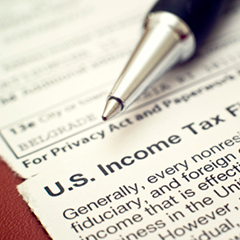Reviewing Taxes for Personal Service Corporations
January 3, 2014 | Tax Planning, Tax Preparation
 Every corporation in Maine must pay income tax at rates reaching up to 35 percent. But the tax burden is even larger for corporations labeled as personal service corporations. In that case, the tax rate is a flat 35 percent.
Every corporation in Maine must pay income tax at rates reaching up to 35 percent. But the tax burden is even larger for corporations labeled as personal service corporations. In that case, the tax rate is a flat 35 percent.
Personal service corporations don’t benefit from the graduated rate structure as other corporations do. This tax law difference can cost some small businesses thousands of extra tax dollars. The impact for personal service corporations is especially acute at lower income levels. For example, a personal service corporation with $100,000 of annual income pays $35,000 in tax in contrast to $22,250 for a regular C corporation—a difference of $12,750.
Naturally, the determination of this tax status is often contested in the courts.
The tax law definition isn’t completely clear-cut, but a corporation is generally treated as a personal service corporation if it meets a “function” and an “ownership” test.
1. Function test: Substantially all, meaning 95 percent or more of employee time, of the corporations’ activities involve the performance of services in a field of law, accounting, health, engineering, architecture, actuarial sciences, performing arts or consulting
2. Ownership test: Substantially all, meaning 95 percent or more, of the stock is held, either directly or indirectly, by employees performing these services or retired employees who provided these services.
Filler & Associates can analyze whether a business satisfies the definition of a personal service corporation and if so, the most tax-effective way it should be structured.
